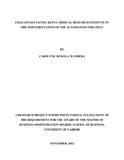| dc.contributor.author | Wandera, Carolyne M | |
| dc.date.accessioned | 2013-02-22T12:10:46Z | |
| dc.date.issued | 2012-11 | |
| dc.identifier.citation | MBA Thesis | en |
| dc.identifier.uri | http://erepository.uonbi.ac.ke:8080/xmlui/handle/123456789/10771 | |
| dc.description | Challenges facing Kenya medical research institute in the implementation of the automation strategy | en |
| dc.description.abstract | Strategy implementation is one of the biggest challenges in modern day strategic management in an organization because strategic decisions influence the way organizations respond to their environment, it is very important that a firm makes strategic decisions and define strategy in terms of its function to the environment. The objective of this study was to establish the challenges faced by KEMRI in the implementation of automation strategy. The specific objectives included: determination of the challenges faced by Kenya Medical Research Institute in implementation of automation strategy and the establishment of what the Kenya Medical Research Institute did to overcome the challenges. This study adopted a case study since the unit of analysis was one organization. The study used primary data collected using an interview guide with six senior managers in the organization to avoid duplicity of data. KEMRI faced several challenges in its automation strategy implementation including inadequate resources to finance the implementation of the automation strategy, high resistance from staff who were meant to be the implementing agents but preferred status quo, Inadequate office and limited training on the new Enterprise Resource Planning software system. To respond to the challenges, KEMRI leadership created awareness of the automation of KEMRI business processes so as to foster positive attitude towards the planned change in work processes so as to reduce resistance from employees. It also facilitated resources availability despite the diminishing funding from the Exchequer. KEMRI also established an implementation committee which comprised of members from different departments who were put in charge of monitoring progress of the automation strategy hence promoting automation strategy implementation. To deal with these challenges, KEMRI ensured smooth flow of information by ensuring that all employees were well communicated to on matters of the automation strategy. To deal with limited employee skills on ERP system, KEMRI invested into capacity building where employees with limited skills were trained on how to use the system. It also ensured successful automation strategy by incorporating the automation strategy into its employees’ daily job descriptions which meant it became part of employees’ evaluation key deliverable indicator. | en |
| dc.description.sponsorship | University of Nairobi | en |
| dc.language.iso | en | en |
| dc.subject | Challenges | en |
| dc.subject | Kenya medical research institute (KEMRI) | en |
| dc.subject | Automation strategy | en |
| dc.title | Challenges Facing Kenya Medical Research Institute in the Implementation of the Automation Strategy | en |
| dc.type | Thesis | en |

